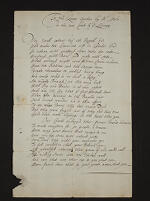Oval portrait of Charles II inside an embellished "C", the top corner of letters patent.
Poems and other literary pieces, with transcripts of some diplomatic documents. On the spine is stamped: ‘M.S.S. Poems of the Time of Charles II. Collected for Robert Viscount Bodmin. Part I.’ The table of contents is at the end (pp. 302–7).
Sem títuloPoems and other literary pieces. On the spine is stamped: ‘M.S.S. Poems of the Time of Charles II. Collected for Robert Viscount Bodmin. Part II.’
Poem addressed to Queen Catherine of Braganza on the occasion of the visit by Catherine and Charles II to Trinity to view the structure of the Wren Library, then being erected. Title as it appears is 'To the Queen spoken by Mr Duke in the new Court by ye Liberary [sic]'. First line, 'You equall partner in the Royall bed...'
Sem títuloTranscript
Whitehall July the 10th 83
My Lord
In the last letter I writ to your Lordship of the [blank] past, I told your Lordship no more but that there appeared great grounds to believe {1} that in case the most horrid assassinate intended against the king’s person, had taken effect it had been seconded, by an insurrection of the ill affected in severall. parts of the kingdome, but now I am commanded by His Majestie to tell you further, that he hath by God’s blessing made such a progresse, since the writing of that letter in discovering the methods intended to promote this insurrection, as also the contrivers of it, and the actors that were to be in it, that they are no longer to be termed appearances but evidences so very clear and so fully concurrent, that there can be nothing more convincing and unquestionable, then what now lyes before him, to prove that a generall insurrection was intended, not onely in this kingdome but in that of Scotland, and that these were all meanes vsed to bring both kingdoms into strickt measures of correspondence and mutuall ayde for the executing of this dessigne. His Majestie would have your Lordship take notice of this as from his self not that you should be hereby obliged to putt the country (in bringing together the militia uppon duty) to any extraordinary charge, or trouble, but that you take care the officers be in all the readinesse that is suitable for times of imminent danger. His Majestie persists still in his dirrection to haue all dangerous persons disarmed, but as the law leaves it to the judgement of your Lordship, and the Deputy Lieutenants, so His Majestie referrs it to your consideration, what persons may be reputed dangerous, at such a time as this, His Majestie assuring himself that your Lordship will connive at no man who may be suspected to haue the least inclination to disturb the peace in the disarming of such, His Majestie would haue adecency† and discretion obserued, not to seize fowling peices or wearing swords, or any other thing, that is tryfling, and not capable of being imployed to doe mischief, in tummults, or insurrections; {2} and it is His Majestie’s further pleasure, that an inventory of all armes so seized by your Lordship’s order (with the persons names in whose house or custody they were taken) be forthwith sent to one of the principall Secretaries of State, to the end His Majestie may give his further dirrections how to dispose of them, This is all I haue in command
I am | my Lord | your Lordships | most humble and | most obedient servant
L. Jenkins
—————
Docketed ‘Sir L: Jenkins | 1683’. Marked in pencil at the head ‘1–1–0’ and ‘291’, these being probably the price and number of the letter in a sale. The valediction and signature are in one hand, the rest in another, the former being presumably that of Jenkins himself. This is one of a series of circular letters sent by Jenkins to the Lord Lieutenants and others, or, more probably, a draft thereof. The capitalisation has been revised, and most abbreviations have been expanded.
{1} ‘to believe’ added in another hand.
{2} The semi-colon is preceded by a comma, which it was probably intended to replace.
† Sic.
